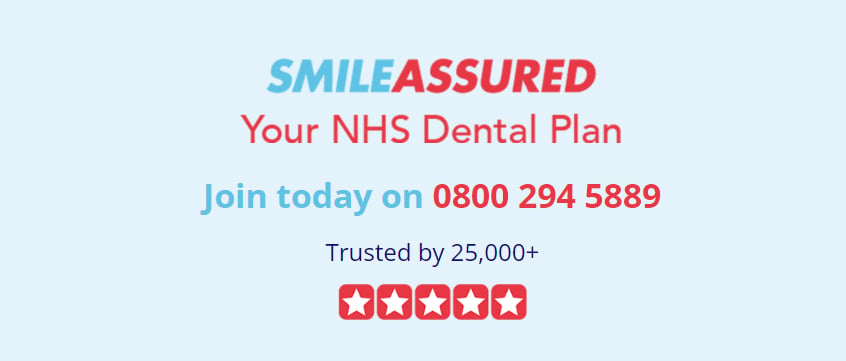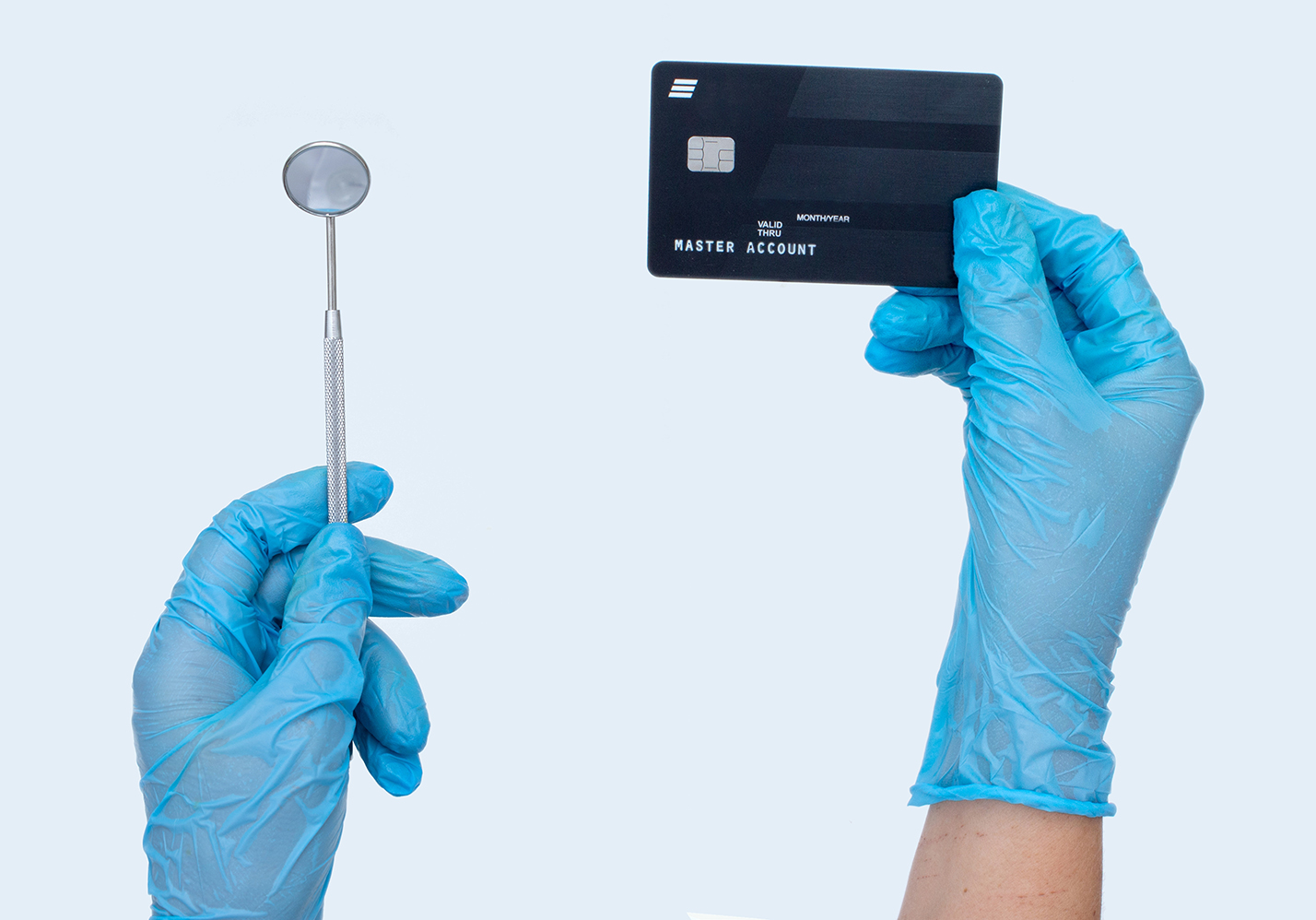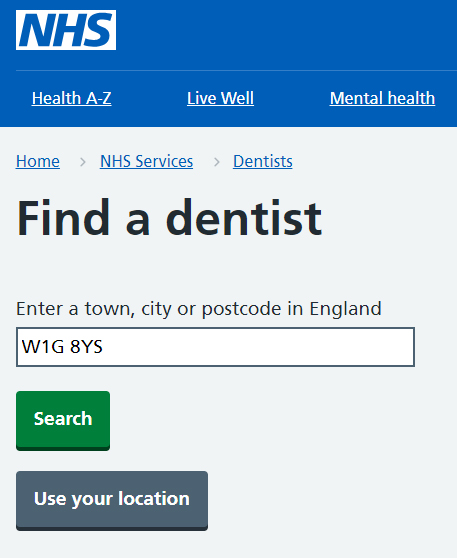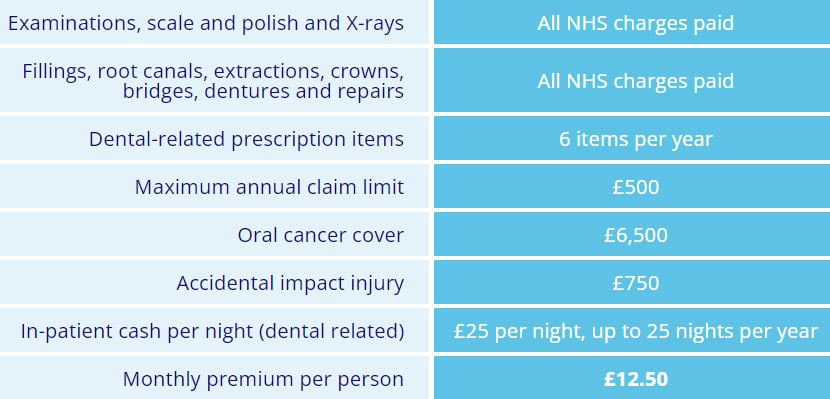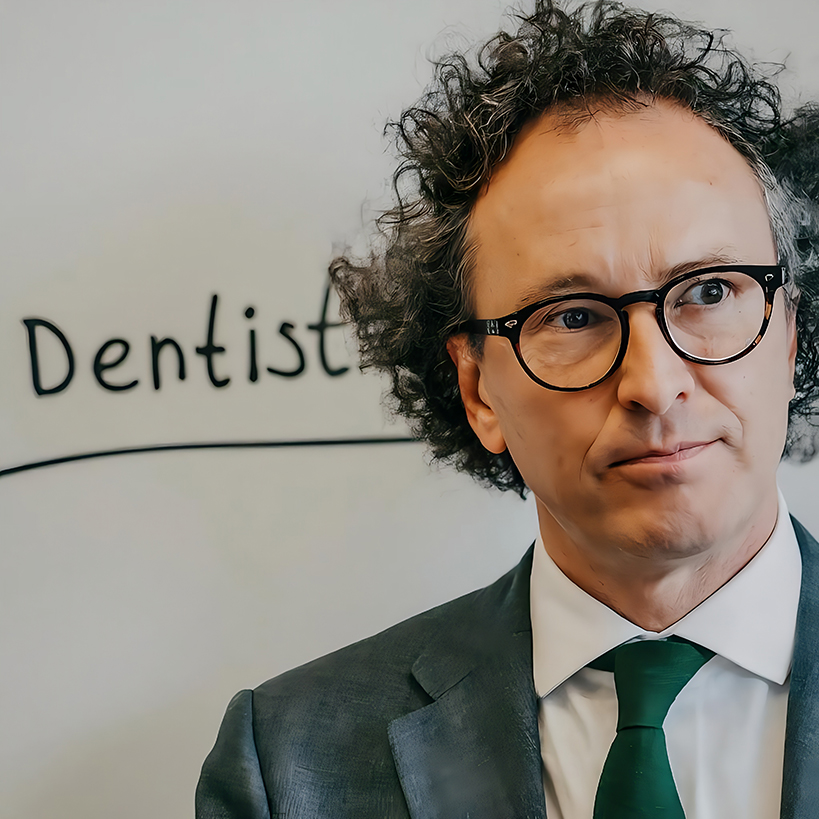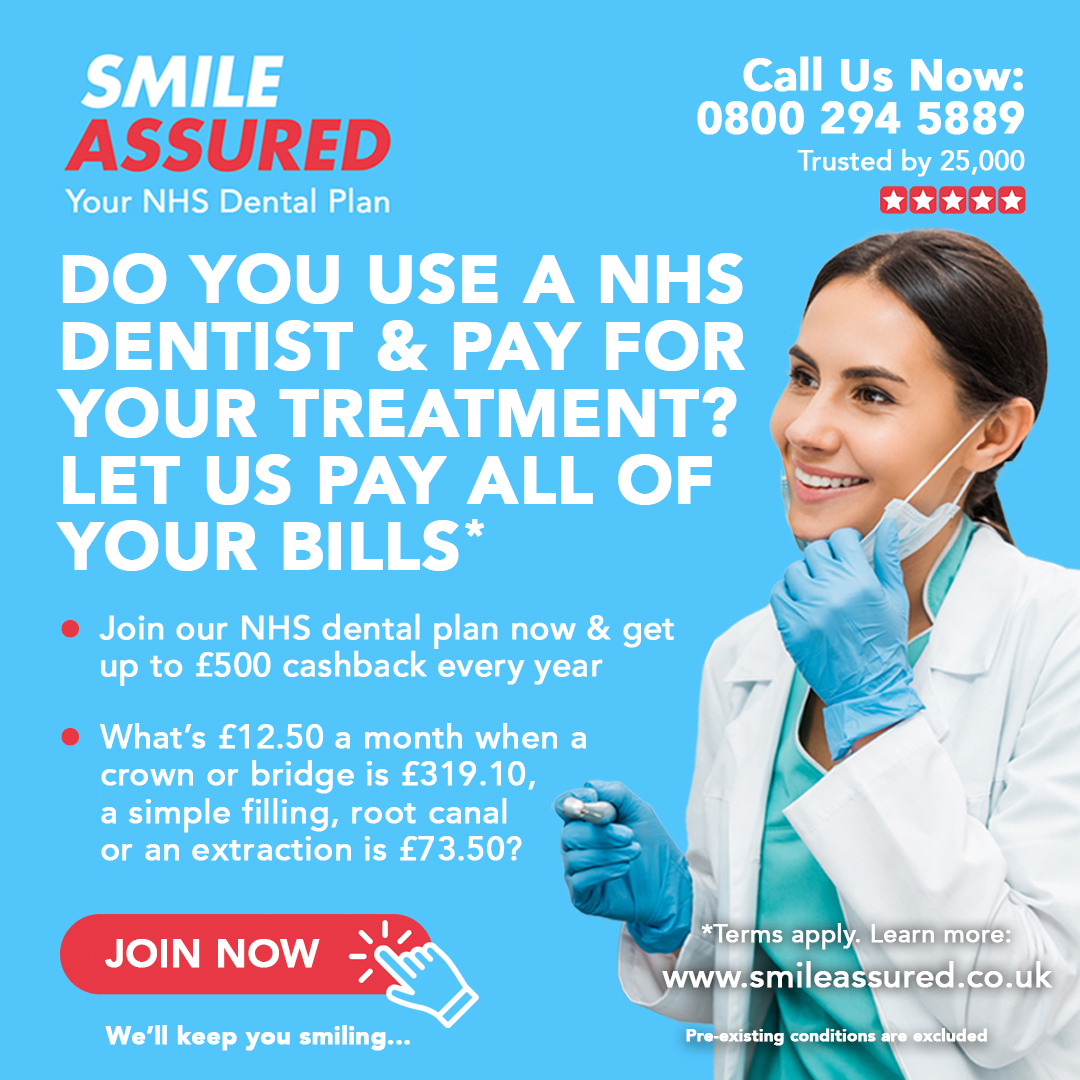RESOURCES FOR YOU
USEFUL FACTS & RESOURCES FOR YOU
While the most frequently asked questions about our incredible NHS dental plan can be found on our homepage here, we’re often asked a wide variety of other more complex questions and/or we get requests for resources from new customers and potential customers alike, especially on our social media outlets and advertising.
Since these questions can range from the weird to the wonderful at times, we wanted to provide as many of the facts, resources and answers for you on this special resources page here since we always want to help everyone as much as we can - even if you don’t actually need or want our policy.
So whether you have specific questions about the nuances of our NHS dental insurance plan or you perhaps just need some simple tips and advice on how to even find a new NHS dentist (something we know is difficult for some people right now) then, hopefully, the answers below will help you get all the information you need to make an informed choice about joining the Smile Assured NHS Dental Plan.
I thought all NHS dental treatment was free? Isn’t it?
No. NHS dentistry is actually one of the very few NHS services where most people have to pay a very significant contribution towards the cost of their treatment and very few people are entitled to free NHS dental care. When the NHS was established in 1948 then dental treatment was free. However, charges were quickly introduced in 1951 for dentures and by 1952 all other NHS dental treatments were then charged for. It has been that way ever since. Charges have then increased annually almost every year since and this normally occurs on April 1st. Prices just increased by 2.3% on April 1st 2025 and they had previously just risen by 4% in April 2024 following an already inflation-busting 8.5% increase back in April 2023. While most adult patients have to pay these very expensive NHS charges, the costs involved are still a lot cheaper than the cost of private dentistry. That’s why over 75% of the population still choose NHS dental care over private dental care.
On the NHS you are effectively only making a contribution towards the cost of your treatment. In England (the prices vary slightly in Wales, Scotland and Northern Ireland - more info on this below), you will likely have to pay a contribution of £326.70 for something like a crown, dentures or a bridge or £75.30 for a simple filling, root canal, periodontal treatment or an extraction (all of which usually follow the £27.40 charge for a dental examination), the government also contributes a cash figure directly to your dentist to cover the true overall cost.
In 2022/23 dental charges to patients provided around 25% of the total funding of NHS dentistry.
So who does get free NHS dental treatment?
Very few people and, sadly, the number of people entitled to free NHS dental treatment is ever-dwindling thanks to the strict policies of successive governments and the long-standing underfunding of NHS dentistry. It’s not even automatically free for the elderly (outside of free prescription charges and, in some regions, examinations) as many may incorrectly think. Although over 30m adults in the UK do currently have a NHS dentist and pay for their treatment (plus many more who would have to pay if they could even find a NHS dentist), there are still thankfully some people who are entitled to free NHS dental care. This criteria differs in England, Scotland, Wales and Northern Ireland as follows:
See who is potentially entitled to free NHS dental care in England here
See who is potentially entitled to free NHS dental care in Scotland here
See who is potentially entitled to free NHS dental care in Wales here
See who is potentially entitled to free NHS dental care in Northern Ireland here
Chances are however that you may be exempt from NHS Dental charges if you are under 18, under 19 and in full-time education, are pregnant or have a baby under 12 months old, are in receipt of Universal Credit, Income Support or income-based Jobseeker’s Allowance/Employment and Support Allowance, are getting Pension Credit Guarantee Credit, have an HC2 certificate and/or you have an NHS Tax Credit Exemption Certificate. If you are on a low income then you may be entitled to some help towards your NHS costs and to apply for this help please see here.
How much is NHS dental treatment for the majority of us who do have to pay?
NHS dental fee structures are complex and vary across the UK with different NHS charging rates for Wales, Scotland and Northern Ireland compared to England. If you're in Wales, Scotland or Northern Ireland then the Smile Assured NHS Dental Plan makes it easy for you by reimbursing all your NHS dental charges up to £500 per year using the NHS England scale of charges (so you're covered anywhere in the UK). While the England scale of charges is cheaper overall than Scotland and Northern Ireland, it is more expensive than Wales (who recently made the largest increase to charges in NHS history with some charges more than doubling). Any price increases outside of England have yet to be announced although Scotland, for example, officially says "there may be an increase in the price you pay for your NHS dental treatment to ensure we are able to continue to provide NHS dental services and reflect the increase in cost of delivering the care required for patients".
We'll list all the charges in the different regions for you below but here are examples of the current costs in England for the most common treatments:
Band One (£27.40):
This covers basic everyday treatments like examinations, X-rays, scale & polish, moulds & also emergency treatment.
Band Two (£75.30):
This includes fillings, root canals, periodontal treatments, teeth extractions, apicectomies etc.
Band Three (£326.70):
This covers more complex procedures like crowns, bridges, dentures & various other NHS treatments.
For more precise cost figures for each country in the UK then here are some useful and official links for you:
You can see the costs of NHS dental treatment in England here (currently capped at £326.70 per course of treatment)
You can see the costs of NHS dental treatment in Scotland here (currently capped at £384.00 per course of treatment)
You can see the costs of NHS dental treatment in Wales here (currently capped at £260.00 per course of treatment)
You can see the costs of NHS dental treatment in Northern Ireland here (currently capped at £384.00 per course of treatment)
Do bear in mind that it is common for many people to need several different courses of treatment annually and that many people do indeed pay hundreds of pounds every year just for routine dental treatment. It is worth noting that the NHS has a "2 Month Rule". This means that if within 2 calendar months of completing a course of treatment you need more treatment from the same or a lower NHS charge band (such as another filling if you have just had one) then you do not have to pay anything extra. If the additional treatment needed is in a higher band though, you'll have to pay in full for that new NHS course of treatment. That means if you have a £75.30 filling and then need a crown then you would have to pay an additional £326.70. It also means if you have a Band One £27.40 examination then they will then charge you for most treatments that come out of that which tend to fall in either Band Two (£75.30) or Band Three (£326.70) so this two month rule often isn't as fair as it may sound. Worse still - if you visit at the end of any given calendar month then this rule only applies to a treatment that is then delivered by the end of the following month (if you can even get an appointment that quickly) so, in a lot of cases, it is often really just a 1 and a bit month rule and therefore quite misleading!
Are NHS dental treatment costs one of my largest & most unavoidable bills?
According to the hard statistics then, for many people, yes.
One of the biggest problems we see alongside NHS dental availability is the spiralling cost of treatment which rises every year in April. According to the British Dental Association (in February 2025) then just in England alone, not only did 5.4m adults not even attempt to make an appointment in the last 2 years (because, often wrongly, they didn’t think they could secure care) the often prohibitive cost of NHS dental treatment also pushed a further 1.25m adults away from getting the vital NHS dental treatment they needed. This is something Smile Assured customers never have to worry about. The fact is that in the current economy, an unexpected and unwanted bill of £326.70 for something like a crown or a bridge can be an impossible choice to make when faced with just paying a utility bill or a mortgage or instead getting vital dental treatment. Delaying treatment typically leads to even more dental work being required. We exist to prevent this eventuality for all our customers and we are a lifeline for many of them. Over 97% of our customers renew their policy with us which speaks for itself.
Official figures like this in recent years have consistently demonstrated that around 1 in 10 adults in the UK have been missing out on dental care through a combination of cost and perceived availability. According to a recent report, of all the people who did try to get an NHS dental appointment in the previous 2 years, 91.6% of them were actually successful. Of course, that still leaves a large number of the population disenfranchised and we hope that all the new government measures listed below help to close this gap fast.
On the face of it (according to the British Dental Association in February 2025), the total unmet need for NHS dental care in England amounts to 13m adults and that is 1 in 4 of the adult population. However, that figure includes those same 5.4m adults who did not attempt to even make an appointment in the last 2 years (thinking they may not secure care when many actually could) plus those 1.25m adults who were pushed away from getting dental treatment because of the cost. The unmet need is therefore closer to 6.35m adults which is more like 1 in 8 adults in England. That is obviously still way too many but it’s not quite as grim as the initial headline figure of 1 in 4. Of course, these unmet needs are not spread equally across the country given the postcode lottery nature of NHS dentistry and the needs in coastal, remote and rural areas are often greater than in other areas thus making the situation feel worse than it is for those people. Part of the new governments plan however is to better reward those dentists who practice in those less served areas and "buy" more appointments in these so-called 'dental deserts' which we will come onto.
What is the governments plan for dental recovery?
Based on a recent House of Commons Library estimate, real-terms funding for dental services (accounting for inflation) for the last accounted period of 2022/23 fell by 19% since 2010/11 despite a significant increase in population and need during that same period. This was also despite inflation busting increases in the costs of NHS dental treatment every year. This means that NHS dental funding dropped from £3.56 billion in 2010/11 to £2.90 billion in 2022/23. This underfunding has been dovetailed with a series of poor policy decisions by recent governments and what dentists have felt were poor remuneration contract offers. This has pushed many dentists who previously provided NHS treatment into now either working 100% privately or offering significantly less NHS dental treatments than they used to. That is why in many areas many people are still struggling to find a NHS dentist. We do offer tips below on how to find a dentist and there are plans in place to improve matters as we will come onto.
It's worth noting that the last government did have a so called 'NHS Dental Recovery Plan' which they announced in early 2024 (but then went on to completely not deliver on any of it at all) so let's just now focus on what the current government are doing (or at least claiming to):
700,000 Additional Appointments In England
According to the Department of Health & Social Care, NHS England, Stephen Kinnock MP and Gov.uk on the 21st February 2025 then the current government announced that it is delivering on its manifesto commitment to roll out extra urgent appointments across the country and that ‘dental deserts’ (where patients struggle in particular to get appointments) are specifically being targeted. The British Dental Association at least called this “progress”.
According to Health Minister Stephen Kinnock’s announcement, hundreds of thousands more people across England (with action also being taken in Scotland, Wales and Northern Ireland) will very soon be able to access NHS dental care with the government and NHS rolling out an additional 700,000 dental appointments from April 2025. The minister stated that NHS England has written to integrated care boards (ICBs) across the country to direct health chiefs in each region to stand up thousands of urgent appointments over the coming year. All these extra appointments will be available from April and are being targeted at those dental deserts where patients particularly struggle to access NHS dentists. This includes parts of the east of England (such as Norfolk and Waveney) where there are just 31 NHS dentists respectively for every 100,000 people (way below the national average).
Focusing On Under-Served Areas
The government is recruiting new dentists to the areas that need them most and intend to reform the dental contract with a shift to focusing on the retention of NHS dentists. This includes a golden hello bonus incentive payment of £20,000 offered per dentist for up to 240 dentists who will agree to work in areas of the country that have traditionally been hard to recruit to. The last government promised this and delivered zero but the government has at least immediately delivered 68 of these posts with more to come.
It is worth noting that since early 2022, the NHS has already required dentists to operate at 85% of their pre-pandemic activity. There are still heart-rendering stories in the media of patients unable to find a dentist and having to self-treat but the fact is that all dentistry is more-or-less close to pre-pandemic levels on the great scale of things. Most of the areas that struggle with NHS dental availability have, typically, always struggled (coastal towns, remote & rural areas etc.) but it is clear there are far less NHS dentists than there used to be. Why? Well, COVID certainly didn’t help as dentistry effectively had to entirely close down for a significant period of time and, thereafter, services were still limited for a further period. However, since dentists are essentially all private contractors to the NHS, the contracts offered to dentists by successive governments (especially since 2010) have, unfortunately, encouraged many of them to move into private work as they were/are not happy with the NHS contracts offered. This is one of the main reasons why, for a lot of people, their dentist has suddenly switched entirely to private dentistry.
None of these measures are close to perfect in our opinion and we want to see more deeds and less words by the government. It is good though that Labour promised to "tackle the immediate crisis with a rescue plan to provide 700,000 more urgent dental appointments and recruit new dentists to areas that need them most." and are now following through on that plus that they have committed "to rebuild dentistry for the long term" with by "reforming the dental contract with a shift to focusing on prevention and the retention of NHS dentists". It remains to be seen of course whether this all goes exactly to plan but for now we'll give you some simple facts and tips below on what to do if you are indeed still struggling to register with a new NHS dentist.
You can by the way see an actual list of the number of appointments being “purchased” by the government and delivered from April for all the individual integrated care boards here. 21,520 appointments are being purchased in Norfolk for example, 24,360 in Nottingham, 24,269 in Devon etc.
What Would We Do?
We may merely be a family run insurance business but we do have opinions on the current status quo as the more people who have a NHS dentist then the better it is for us! Aside from improving the dental contract on offer for dentists (so that more want to work in the NHS) and doing many of the things already mooted like focussing on the under-served areas, we of course want to see the dramatic underfunding of NHS dentistry put right by the government as that's clearly a big part of the picture. Cutting a cake by about 20% as the last government did over the past decade or so and then trying to feed even more people with the remnants was never going to work! With the cost of living crisis, we'd like the government to just give people a break by not significantly increasing the cost of NHS dental treatment every April as they just have yet again (albeit by a more modest 2.3% compared to anywhere up to 8.5% under the previous government) and for the relevant authorities to also now clamp down on those dentists who are advertising that they are taking on new NHS patients (when they aren't) so they can get people in through the door and then 'bait and switch' those same patients into paying for costly private treatment. That is predatory and it is wrong. If you see any malpractice like this then we would certainly urge you to report it to the General Dental Council here and also to the Advertising Standards Authority here.
If we had to give you just one big idea to fix matters quickly, here it is...
The percentage of new dentists who go straight into private work (after just receiving £300k of taxpayer funded payments of which a mere £100k is even remotely repayable by them) is, quite frankly, crazy. Of the more than 35,000 dentists registered with the General Dental Council in England, just over 24,000 delivered some NHS care in England in 2022 to 2023. This means that around a third of registered dentists are not contributing to NHS dentistry in any way at all and seem to be solely working in private practice. We are all for free enterprise but how do we shift this paradigm when we all want and need more dentists in the NHS and a better funded NHS dentistry regime yet we are effectively giving £200m away every year to new dentists and placing no obligation on them to ever work in the NHS? How do you force a dentist to work in the NHS though?
Well, we were, notionally, very pleased to see that there was actually a government consultation in 2024 about whether newly qualified dentists should be forced to deliver NHS care for several years after they graduate. If they do not then the penalty under discussion was that they should have to repay more (or indeed all) of that £200k or more of free funding that just got them trained to be dentists and, in doing so, gives them a serious and lifelong income thanks to the taxpayer. This consultation was done under the last government so we are not sure if it has since been followed through on but surely this would be a very good idea and be for the benefit of us all? National Service for dentists!
Let's say for argument that the £200,000 that a new dentist just got for free should equate to them having to deliver 2,000 NHS dental treatments over a period of at least 2 years as a minimum unless they want to repay all of that money to the taxpayer. 2 years is equivalent to about 500 working days which equates to them treating just 4 NHS dental patients per day. NHS dentists see around 20 to 30 patients per day and private practice dentists typically see about 10 to 15 patients per day so this would absolutely not prevent them from doing a very large amount of lucrative private work if they so wished. Around 1,000 new bright-eyed dentists are unleashed into the wild every year so such an initiative would potentially see 1m more NHS dental appointments delivered to patients every year. This alone would largely solve the current crisis in terms of NHS dental treatment availability and possibly eliminate the need for more gimmicky things like the additional £20,000 "Golden Hello" payments currently being offered to dentists when many would argue that it's just the right thing for them to spend at least some time serving the NHS to start with! You may argue that some of these new dentists would work in the NHS anyway (which would skew that figure of 1m extra appointments) but in return for writing-off the £200,000 of taxpayer money then surely it is not too much to ask that they simply squeeze in an extra 2,000 NHS dental appointments over a period of say 2 to 5 years by slightly extending their working hours? Junior doctors for example generally work an average of 48 hours per week with up to 72 hours on duty in any given week so it's not an unreasonable expectation in this field!
I don’t have a NHS dentist. What tips do you have to find one?
In addition to the 700,000 new NHS appointments that came online from April 1st 2025 then it is also true that more dentists have been offering NHS dental treatment over the last 12 months. From the figures released for just one quarter recently then nearly 500 more practices across England alone were accepting new adult patients in that period. According to data compiled from the NHS Find a Dentist website shown below, 1,417 practices were listed in that period as taking on new NHS patients compared to 929 practices listed in the previous quarter so that was a net increase of 53% (i.e. 488 more NHS dental practices taking on new NHS patients). Plenty more have come on-stream since then and are continuing to do so so the seeds of recovery do seem to actually be there. This NHS Find A Dentist tool is not the most accurate tool in the world (it is after a government tool) but it clearly does work for a lot of people including many people on our team!
If you're struggling to find and register at a new NHS dentist the first thing we suggest is indeed looking at this NHS Find a Dentist tool here. It is not a perfect tool nor is the information provided always accurate or complete but it has worked for many people. We do recommend searching for a few different areas/postcodes that are close enough to you to be viable to travel to. In using this easy tool then yes - you will indeed see that many dentists are either not taking on new NHS patients or don't say one way or the other. However, many will be and others will be also accepting new patients from "referrals". Referrals mean that if you went to a hospital for emergency treatment (for example) then the hospital dentist will often then refer you to a dentist to complete your course of treatment. You are usually then registered at that practice moving forwards. See the paragraph below where we discuss calling 111 for more information on this.
We also recommend you call around dentists, perhaps using the list of dentists in the find a NHS dentist weblink. We find that it’s always worth calling dentists first thing in the morning and asking them if they've had any cancellations. If so, many will definitely want to fill that slot. While it’s a big hassle to even have to do this, we have seen this approach work for many people.
While many people say they have tried and tried to call dentists like this, when questioned many admit that they have only really made cursory attempts, perhaps just every month or so. 5.4m adults have not even attempted to make an appointment in the last 2 years because they think, often wrongly, they will not get one. Anyway, regardless of why you don't have a dentist right now, the key to getting one is perseverance. Don't give up - especially when the new measures outlined previously will continue to take effect so in some ways it's "fastest finger first". It's always worth just getting yourself on a waiting list (or at several dentists which you are able to do) since although you may initially be told that a practice's waiting list is months or more, you may suddenly get a call asking if you can come in quickly because a cancellation has come up. Time is money and everyone is late and the fact is that dentists really don't like empty slots as it is dead space for them! On this point, many people tell us the reason they don't have a dentist anymore is because they missed 2, 3 or more appointments and were subsequently de-listed. Firstly, this happens all the time and, along with people who move away etc. is why spaces always eventually come up at a practice - you just need to have your name in the hat! Secondly, dentists lose money on no-show appointments which is why they have strict rules on attending appointments so the lesson here is if you get a NHS dentist then don't fail to show up for an appointment and expect the dentist to not take any action. In this day and age, cherish your place with a NHS dentist!
Another more “creative” tip is to call a dentist who does NHS work but say that they are not accepting new patients, just private patients. Softly indicate to them that while you want routine NHS dental treatment, you may also want to take advantage of some of their private options. We have seen many dentists accept new NHS patients on this basis since they are often then looking at the future big pay-day from your "planned" private work like those implants you're dreaming of!
Don't forget that you are of course fully entitled to call the NHS on 111 if you think you require urgent dental care. If applicable, they will facilitate emergency treatment for you. As highlighted previously, if you do get emergency treatment this way then you will often then be later transferred onto a NHS dentist thereafter and thus end up registered with them moving forwards. It may sound cynical but sometimes the truth is that the reason that some NHS dentists not accepting new NHS patients are choosing to accept hospital referrals is because the work they then get is often potentially more complex and lucrative. If you're worried about dental symptoms then you can also do all this online on the NHS 111 website here. You will simply have to answer some questions and, whether it is by phone or on the website, they will then tell you what to do next. Depending on your symptoms, this may involve you going to A&E, being sent to an urgent NHS dental treatment centre, getting you to see an emergency dentist or just helping find you a NHS dentist.
We also wanted to let you know that, as well as complaining to the General Dental Council if you have an issue with a dentist here, you should take a look at Healthwatch who are a health and social care champion. Their role is to make your voice heard to improve care. They have the power to make sure NHS leaders and other decision makers listen to your feedback and improve standards of care. They can help you find reliable and trustworthy advice and information, help you make complaints and they help around a million people every year have their say and get the support they need. You can find your local Healthwatch here.
Ultimately, we know it's a nightmare for a lot of people at the moment and we fully empathise even though it is completely beyond our control as a mere family run UK insurance business (plus it hurts us too since we can only help people with a NHS dentist). This was clearly one of the issues at the last ballot box for many people! Once you do find a dentist then you really should join us here and we'll quickly reimburse all of your NHS dental bills up to £500 every year with immediate cover, no excess, no hassle and not even an annual contract.
What NHS dental treatments do you cover on your NHS dental plan?
We cover all NHS dental treatments and at every single NHS dentist in the UK too. You can see a list of all the most common NHS treatments available on the NHS
on the official NHS site.
Don't forget that we also provide an incredible amount of additional value too including £6,500 of oral cancer cover, £750 accidental impact injury compensation and even in-patient cash of £25 per night for up to 25 nights per year!
We'll keep you smiling!
£6,500 of oral cancer cover sounds great but is that even a common thing?
Sadly yes. While we hope it is never something any of our customers ever suffer - new cases of mouth cancer in the United Kingdom have risen to a record high. Figures from the Oral Health Foundation showed that 8,864 new people in the UK were diagnosed with the disease in 2021. That's an increase of 34% compared to 10 years ago and that has more than doubled by 103% within the last generation. While the Smile Assured NHS Dental Plan cannot directly help this fight, our plan does, by design, help ensure our customers go to their dentist regularly as all the costs of them doing so are covered by us. This dramatically enhances early diagnosis. Not only do we include £6,500 of oral cancer cover as part of the policy but we also provide daily payments for hospitalisation relating to dental treatment and we also give you the cash back for dental-related prescriptions as part of the £500 a year of claims that we allow you to make every year.
Why don’t you cover pre-existing treatments?
Because no insurance is ever retrospective! If it is was then every insurer on the planet would be bankrupt! Insurance is by design about protecting yourself from future eventualities. Think about it logically - if you were uninsured and crashed your car, you obviously could not just take out a new car insurance policy to claim that money back. Nor could you take out home insurance to claim for a burglary that happened last week! Consequently (and completely fairly) we only cover new dental conditions that occur after joining. So while you clearly can’t claim for a crown that you just had, you can of course claim for all new conditions that occur after you join so the sooner you do
us then the better! If you have had treatment recently or have something like dentures booked in following a diagnosis you have already had then while you of course can't just claim back for that (as it has already happened), the chances are clearly high that you will need more treatment in the future so joining us now will mean you life will get a lot easier in the future!
Because no insurance is ever retrospective! If it is was then every insurer on the planet would be bankrupt! Insurance is by design about protecting yourself from future eventualities. Think about it logically - if you were uninsured and crashed your car, you obviously could not just take out a new car insurance policy to claim that money back. Nor could you take out home insurance to claim for a burglary that happened last week! Consequently (and completely fairly) we only cover new dental conditions that occur after joining. So while you clearly can’t claim for a crown that you just had, you can claim for all new conditions that occur after you join so the sooner you do
us then the better! If you have had treatment recently or have something like dentures booked in following a diagnosis you have already had then while you of course can't just claim back for that (as it has already happened), the chances are clearly high that you will need more treatment in the future so joining us now will mean your life will get a lot easier in the future!
Why do you only cover people up to the day before their 70th birthday?
While we would absolutely love to cover everyone, like all insurance companies we have independent underwriters. Their actuaries set conditions that we have absolutely no control over. Age limits are not an uncommon thing in the insurance world, just look at car insurers for example. Many of them will not insure people over or under certain ages and that is determined by the underwriters, not by the insurance provider. However, on the good news front, once you do
our policy then you can then stay on it for as long as you like.
Is this cover available at every NHS dentist?
Yes. In fact, it’s actually not even the choice of the dentist whether you can claim with us or not because the way it works is that you just pay the dentist as normal yourself and you then immediately make a simple online claim with us (which takes 2 mins) plus you provide us with a copy of your receipt. You can also do this by post should you so wish. We then usually reimburse your bill within 2 to 3 working days up to your maximum claim limit of £500 per year per person.
Why is your NHS dental policy better than any others on the market?
Firstly, dealing with a small, family-based UK business that offers a simple, straight-talking solution is something that our tens of thousands of customers really do appreciate. You're not having to deal with a huge faceless corporation who keeps you on hold for half an hour pressing multiple buttons just to eventually reach a friendly human when you want to make a claim!
Also, with us there is no excess, we do not ever increase your policy premium no matter how often or how much you claim, we provide immediate cover with no waiting period to claim, the price is super competitive anyway, claims are rapid and easy, you can claim back 100% of the treatment costs and not just up to 50% like some others, there is no annual contract, no automatic annual renewal and nothing to pay today when you join - you just set-up a direct debit for future payments. Then there’s all the added-value we throw in like £6,500 of oral cancer cover, £750 accidental impact injury compensation and even in-patient cash of £25 per night for up to 25 nights per year. Once you
us then you can also stay on the policy for as long as you like no matter your age. We are also kind to children and small animals!
It is true that there are some other providers on the market and a couple of them are even slightly cheaper than us on paper although they are, in those instances, offering a much-lesser product that include conditions like a significant excess or an annual contract you are stuck to. We believe we offer the best, the most comprehensive and the most competitive NHS dental plan on the market and we genuinely care about all of our customers.
Fact is that on a completely like-for-like basis, the Smile Assured NHS Dental plan offers by far the lowest-cost per month of cover on the entire market which makes it the most affordable policy with the best overall benefits? There's no waiting period to start claiming (with others it is between 1 to 3 months to start claiming and even 12 months for some treatments), there is never any excess to pay (we pay back 100% of your bill and not just 50% or 75% of your bill like our nearest competitor does and who offer a whole lot less cover to start with anyway for a far higher monthly cost - all after waiting 3 months to even be eligible to claim), we cover all NHS dental treatments (so we don't exclude things like dentures or periodontal treatments), there's no annual, auto-renewing contract like everyone else, you can join up to the age of 70 and then stay on the plan for as long as you like (not just 65 like others), we don't limit the amount of claims you can make each year and we offer all members a great deal of added-value including £6,500 of oral cancer cover, cash for dental hospitalisation, money back for your dental prescriptions and much more! That's why we have the very best, the most competitive and most feature-packed policy on the entire market.
It costs £12.50 a month. If I only have a couple of check-ups will I lose out?
Not really but it’s reasonable question to ask. On the face of it then if you only had two check-ups in a year and claimed for nothing else then you would be reimbursed £54.90 versus the annual cost of £150. That's like any insurance though - there are always peaks and troughs and what you’re really paying for is the total peace of mind and complete confidence that if you did suddenly get a large, unavoidable and unexpected dental bill then it will just get dealt with for you. Our tens of thousands of happy customers get that. To reiterate, the cost of just one Band 2 treatment (like a filling, extraction or root canal) is £75.30 and that's over 6 months of cover on our policy (plus it is rare to not also have to pay the Band 1 price of £27.40 for the examination to even identify that treatment in the first place pushing the overall cost well past £100). Band 3 treatments (like crowns, bridges, dentures etc.) are now £326.70 so that's over 26 months on our plan! We are thus very good value. That's why our customers stick with us.
Some years you may claim up to the maximum, others less so. Peaks and troughs as stated. Look at it like home insurance - you pay your premium and you get the peace of mind that if anything happened you know you will be covered for what could otherwise be a very high bill. The difference with us versus that type of insurance though is that our policy price doesn't change no matter how many times you claim and there is no annual contract and no excess. It just stays at £12.50 a month - the cost of a small takeaway!
Naturally, if you are lucky enough to have absolutely perfect teeth and have the conviction this situation will categorically remain unchanged over the coming year then sure - our policy may not be right for you at this moment in time! However, we would still argue that since we (like all insurers) do not ever insure anything retrospectively then it's always better to join us now before an unexpected dental event occurs rather than after. Even for those who sometimes spend a little more than they ultimately claim back, they are usually delighted to have avoided a big outlay at a particular moment in time since they have instead just averaged that large unexpected cost over the course of their policy.
You often say “A NHS Dentist”. Isn’t it supposed to be “An NHS dentist”?
Is that Meghan Markle on some of your adverts?
You would be amazed at how often we get asked this question - certainly a lot more than you'd think! We will have to be cute here by leveraging our privacy policy and saying that, for data protection purposes, we can neither confirm nor deny that Meghan Markle is either a Smile Assured customer and/or an official ambassador of ours!
Meghan does have beautiful teeth though and we hear she does like a good deal...
Does your plan include things like implants, veneers etc?
Very unlikely. Implants are not free on the NHS nor are they even available on the NHS as a treatment/service, at least not 99.999% of the time. The government will always prefer to cover cheaper alternatives for tooth replacement (such as dentures or bridges) as, in almost all cases, these are still viable options for restoring oral function. Very simply, implants cost thousands per tooth (see below) and for them to ever be delivered on the NHS they have to be deemed and empirically proven to be "clinically essential" by a NHS dentist. That hardly ever happens outside of the very rare circumstances listed below. In short, implants, veneers or anything else of that nature are practically never covered on the NHS as they are almost always classed as being elective, private and cosmetic dental treatments for which far cheaper options are available. While other dental solutions like inlays, pinlays, onlays etc. are available in very limited circumstances it is again still very rare for this to occur and they are usually charged by the dentist as a private treatment if they can't be justified as being clinically essential (and they usually can't be).
There are however very, very rare circumstances where a dentist does class certain treatments of this nature as being "clinically necessary" (see below) in which case they are usually then delivered as a £326.70 Band 3 NHS treatment (which generally incurs a significant loss for the dentist performing this work even with the additional government contribution which is another reason why it is such a rare occurrence). Think about it logically - is any government ever going to voluntarily offer anyone on the NHS who wants it a free several thousand pound cosmetic treatment of any kind? Of course not because if they did then there would be a lot of people walking around with Turkey teeth, a facelift, tummy tuck and hair plugs and there'd be nothing left in the coffers! Outside of the very limited scenarios listed below, the government will only ever contribute to routine / basic dental care and the overwhelming majority of adults are still made to pay a significant contribution just to that!
So while it is highly improbable that you would ever be able to claim for anything like veneers or implants on the NHS and, in turn, on any NHS dental insurance policy, always remember that even if you did have a full cosmetically enhanced set of teeth - something that you will likely have paid thousands and thousands for privately - you will still always need basic NHS dental care and we cover you for £500 of that type of vital treatment every year! You can see a list
on the NHS website of what all the main treatments are that are available on the NHS.
Just to expand on the only ways it is even remotely possible to get something like implants for free on the NHS:
(1) Severe medical need
The NHS will cover dental implants in cases where they are deemed absolutely clinically necessary due to a very serious medical need such as reconstructive surgery after a major trauma or after head and neck cancer.
(2) Inability to wear dentures
If a patient is unable to wear dentures then they may be eligible for NHS dental implants. This is exceptionally rare though as with modern techniques and technology, dentist’s will almost always be able to find an alternative solution or create dentures that do fit. And you have to be assessed as legitimately requiring dentures in the first place to even be in a position to then claim you are unable to wear them.
(3) Severe facial or tooth injury
If a patient has a major facial or tooth injury that requires reconstructive surgery then, in exceptional circumstances, they may potentially be eligible for NHS dental implants.
If you qualify in any of the three areas above then yes, you should certainly speak to your NHS dentist but if you don’t then expect to pay several thousand pounds privately (most private cosmetic dentists do now offer payment plans though).
Just to give you an idea of the almost inescapable private costs involved, just one dental implant for just one tooth usually costs between £1,750 and £3,000 (depending on the provider). This price will include the implant itself, the abutment (which connects the implant to the artificial tooth), and the crown (the artificial tooth). We can cover the cost of crowns on our plan (as long as they are delivered as a £326.70 NHS treatment and not a private treatment) and can probably cover examinations too if they class them as a NHS Band One examination. The rest of the cost (which is most of the cost) is listed above and that involves the actual surgery plus all the other associated costs like consultations etc.
I am considering cosmetic dental treatment abroad. Your thoughts on this?
Yes. Don’t do it. We know it can be very tempting based on the prices and from what you may have seen from paid celebs and influencers but, trust us, it is very dangerous with many risks involved and it’s likely you have not seen the many, many horror stories. Yes you can get “Turkey Teeth” and save money doing so but, equally, you may well end up in lifelong pain and few (if any) of these cosmetic solutions are permanent anyway since you will usually need to get everything redone periodically (and that’s even if you still can because this kind of dental work usually involves literally destroying all of your healthy teeth and that’s just fundamentally counter-intuitive). Regardless - you will still always need basic UK based dental treatment anyway and that is still costly and will be far more costly again if you’ve become one of those many horror stories! Horrendous complications, serious infections, poor quality work with poor quality materials, abysmal aftercare and even permanent damage are very common abroad and a lot of the time you will end up getting sold unnecessary or premature procedures anyway with the only consideration being for your money and not for the long-term implications.
In the UK all dentists must be registered with the General Dental Council (GDC) to ensure that they possess all the necessary qualifications and expertise. This registration serves as your first line of defence. Should any issues later arise during or after your treatment in the UK then your dentist is legally obligated to address them. If they fail to do so then you have legal recourse to compel them to rectify the situation or provide compensation and this is your second line of defence. Opting for dental treatment abroad completely lacks any of the same assurances of qualifications and experience. While you may encounter a qualified dentist during your initial consultations (or someone who looks like one), there's absolutely no guarantee that they'll even oversee your entire treatment (or even be involved in it at all) and this often leads to let's say "subpar outcomes". In the event of any complications then you'll also face the daunting task of navigating a foreign legal system and will have to do so in a language that you may not be fluent in. Many of these systems require residency for any legal recourse to be instigated in the first place which leaves you further vulnerable. The chances of you getting any real justice and compensation is very slim. The cost of correcting poor-quality work and complications will usually dramatically outweigh any initial savings you may think you are getting with this risky trend of dental tourism.
In essence, prioritising your dental care within the UK provides you with the most reliable safeguard for your oral health. Many UK dentists now offer payment plans for elective and cosmetic work. Yes it’s more expensive than some locations abroad but that’s because it is safer, better regulated and far superior. Remember that the ads for these companies only ever show you the good and never the bad or the ugly. And with many of those providers, their failures often outweigh their successes. Do not risk it.
What are your sources for all the facts and figures you have quoted?
Although not an exhaustive list, our main sources for all the information on this resources page are the British Dental Association, dentistry.co.uk, YouGov, Health & Social Care Information Centre, NHS Digital, NHS Choices, NHS England, NHS Direct Wales, Scottish Dental, NI Direct, Oral Health Foundation, Parliament, House of Commons, the GDC, the ONS, the DHSC, various cross-checked national media reportage and specialist sources of dental expertise.
Did somebody say there's a free £500 prize draw?
There are absolutely no strings attached, there is no purchase requirement and it takes just seconds to enter.
To put your name in the hat all you need to do is just submit your first name and your email address here and then choose whether you wish to receive future (very infrequent) communication from us. Click enter and then that's it!
The winner will receive their vouchers by the 7th November 2025.
There are absolutely no strings attached, there is no purchase requirement and it takes just seconds to enter. To put your name in the hat all you need to do is just submit your first name and your email address here and then choose whether you wish to receive future (very infrequent) communication from us. Click enter and then that's it! The winner will receive their vouchers by the 7th November 2025.
Questions about this website? Telephone 0800 294 5889 | Contact Us | Terms & Conditions | Privacy Policy
© 2025 All rights reserved. Protego Group Ltd.
Registered Office: Protego Group Ltd, 260-268 Chapel Street, Manchester M3 5JZ. Registered in England 4762595.
Protego Group Limited is authorised and regulated by the Financial Conduct Authority (Number 304363). Details of our registration can be checked on the Financial Services register online at www.fca.org.uk/register or by telephone 0800 111 6768
